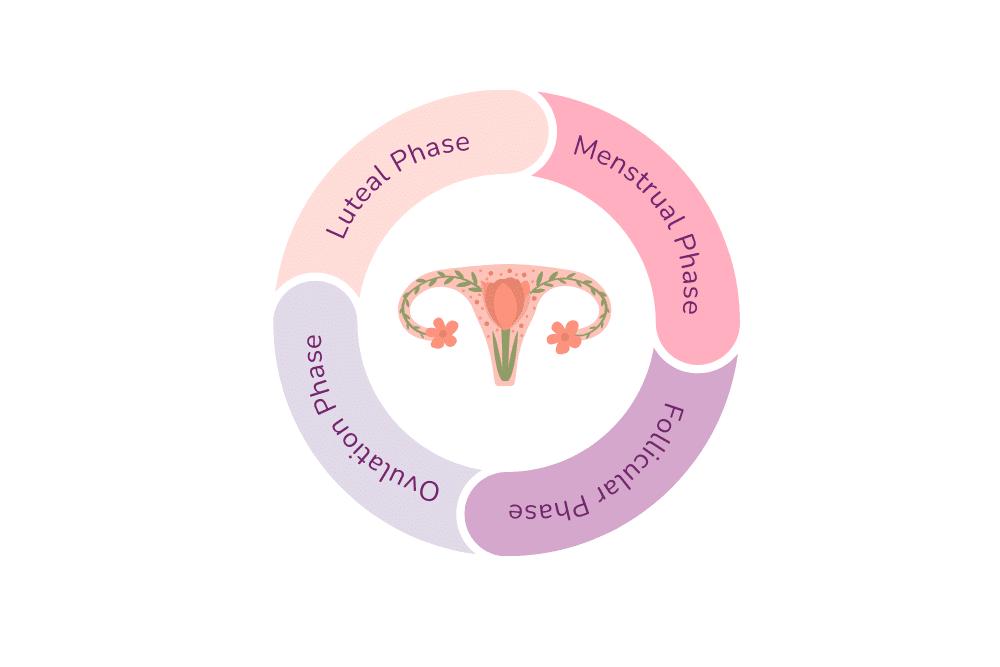The morning-after pill is a backup plan for preventing pregnancy after you’ve had unprotected sex or if your regular birth control lets you down. It’s pretty normal for your period to show up around the time you expect it, even if you’ve taken this pill. But sometimes, the morning-after pill might make your period come sooner or later than usual. If you find your period is more than a week late, it’s a good idea to take a pregnancy test or talk to a doctor.
This guide is all about making it simpler to understand how the morning-after pill can change your menstrual cycle, giving you the info you need when you need a quick contraception fix.
Understanding the Normal Menstrual Cycle
Before delving into how the morning-after pill affects your menstrual cycle, it’s important to understand the basics of a normal menstrual cycle . The menstrual cycle is a complex process involving various hormones and physiological changes in a woman’s body. It’s typically divided into several phases:
Menstrual Phase
This phase starts on the first day of your period and can last between 3 to 7 days. During this time, the lining of the uterus is shed, resulting in menstrual bleeding.
Follicular Phase
Concurrent with the menstrual phase, the follicular phase begins and continues until ovulation. This phase is characterised by the development of follicles in the ovaries, one of which will mature into an egg. The endometrial lining of the uterus also starts to thicken in preparation for a potential pregnancy.
Ovulation Phase
Typically occurring around the 14th day in a 28-day cycle, ovulation is when the mature egg is released from the ovary into the fallopian tube. This is the time when you’re most fertile .
Luteal Phase
After ovulation, the luteal phase begins. If the egg isn’t fertilised, hormone levels (like progesterone and oestrogen) will eventually drop, leading to the start of your next period. This phase usually lasts around 14 days.

Effects of the Morning-After Pill on the Menstrual Cycle
The morning-after pill, a form of emergency contraception, is designed to prevent pregnancy after unprotected sex or contraceptive failure (like where the condom breaks). However, it can have temporary effects on your menstrual cycle. Understanding these effects is essential for any woman considering this emergency option. Here’s how the morning-after pill might influence your menstrual cycle:
Hormonal Impact
- Emergency Contraceptive Ingredients: Most morning-after pills contain levonorgestrel or ulipristal acetate, hormones that affect your natural menstrual cycle. Levonorgestrel pills are available over the counter. Ulipristal acetate pills require a prescription.
- Mechanism of Action: These hormones primarily work by delaying ovulation. If ovulation has already occurred, the pill might prevent fertilisation or implantation.
Potential Changes in the Menstrual Cycle
- Timing of Period: Your next period might come earlier or later than expected. It’s common for the period to arrive a few days off from its usual schedule.
- Menstrual Flow: Some women experience a heavier or lighter flow than normal after taking the morning-after pill.
- Spotting: Unexpected vaginal bleeding or spotting between periods is another possible side effect.
- Menstrual Cramps: Changes in the severity of menstrual cramps can occur, either increasing or decreasing in intensity.
What’s Normal and What’s Not
- Normal Variations: Minor changes in your menstrual cycle, such as a slight delay or change in flow, are typically not a cause for concern.
- When to Seek Medical Attention: If your period is more than a week late, if there’s a significant change in your menstrual pattern, or if you experience severe symptoms, it’s advisable to take a pregnancy test and consult a healthcare provider.
Remember, the morning-after pill is more effective the sooner it’s taken after unprotected intercourse. However, it’s not as effective as regular contraceptive methods and should not be used as a primary form of birth control. It’s also important to note that these pills do not protect against sexually transmitted infections (STIs) or sexually transmitted diseases (STDs).

Timing of Your Next Period After Taking the Morning-After Pill
One of the most common concerns after taking emergency contraceptive pills is “Can the morning after pill affect the timing of your next period?”. The timing of your menstrual cycle can be affected by emergency contraception, leading to a period that may arrive earlier, later, or as expected. Here’s what you need to know about the timing of your next period:
Understanding the Variability
- Early Arrival: For some women, the period may come earlier than usual. This can be due to hormonal changes triggered by the pill, which can accelerate the menstrual cycle processes.
- Delayed Period: It’s common for periods to be delayed after taking the morning-after pill. The hormonal influx can postpone ovulation, leading to a later menstrual cycle.
- Normal Timing: In many cases, your period will arrive around the expected time, despite the use of emergency contraception.
What to Expect
- A Week’s Window: Generally, it’s considered normal for your period to arrive within a week of its expected date after taking the morning-after pill.
- Menstrual Changes: Apart from timing, you may also notice changes in the flow or symptoms of your period, such as increased or decreased bleeding, irregular bleeding, and differing levels of menstrual cramps.
When to Take a Pregnancy Test
- Over a Week Late: If your period is more than a week late, it’s advisable to take a pregnancy test. Although the morning-after pill is effective in preventing pregnancy, it’s not infallible.
- Negative Test but Still No Period: If you have taken a pregnancy test and it’s negative, but your period is still delayed beyond two weeks, it’s recommended to consult a healthcare provider.

Factors Affecting the Menstrual Cycle
While the morning-after pill can impact your menstrual cycle, it’s important to remember that various other factors can also influence its regularity and characteristics. Understanding these factors can help you better interpret changes in your cycle, whether or not you’ve taken emergency contraception. Key elements that can affect the menstrual cycle include stress, lifestyle changes like diet, exercise and sleeping patterns, health conditions like polycystic ovary syndrome (PCOS) and thyroid disorders, hormonal contraceptives like birth control pills and intrauterine devices (IUDs) , medications, age, travel, and body fat percentage.
By considering these factors in conjunction with the potential effects of the morning-after pill, you can gain a more comprehensive understanding of your menstrual health. If you experience significant irregularities or concerns, consulting a healthcare provider is always advisable. They can help determine the cause of menstrual changes and provide appropriate guidance or treatment.
Tracking Your Menstrual Cycle
Tracking your menstrual cycle can be helpful, especially if you’ve used the emergency contraceptive pill. It’s all about understanding your body better and spotting any unusual changes as soon as they happen. Start by getting to know the different stages of your cycle, like how to know when you’ve ovulated and all that. Then, pick a way to track it – an old-school calendar or a fancy period-tracking app that does most of the work for you. Just mark the start and end of your period, and keep an eye on how you’re feeling. This is super important if you’ve taken the morning-after pill, as it can shake things up.

When to Seek Medical Help
If your period is way off schedule, like over a week late, or you’re dealing with really heavy bleeding or super painful cramps, it’s a good idea to check in with a doctor. Also, if things still seem out of whack after taking emergency contraception, or if you think you might be pregnant, definitely get some medical advice. It’s better to be safe and make sure everything’s okay with your health and birth control plan.
For same-day emergency contraception, trust Youly! Start your consult now! »Disclaimer: The information provided in this blog is for general informational purposes only and is not intended to be a substitute for professional medical advice, diagnosis, or treatment. Always seek the advice of your physician or other qualified health provider with any questions you may have regarding a medical condition. Never disregard professional medical advice or delay in seeking it because of something you have read on this blog. Reliance on any information provided in this blog is solely at your own risk. The health and medical information on this site is provided “as is” without any representations or warranties, express or implied.

